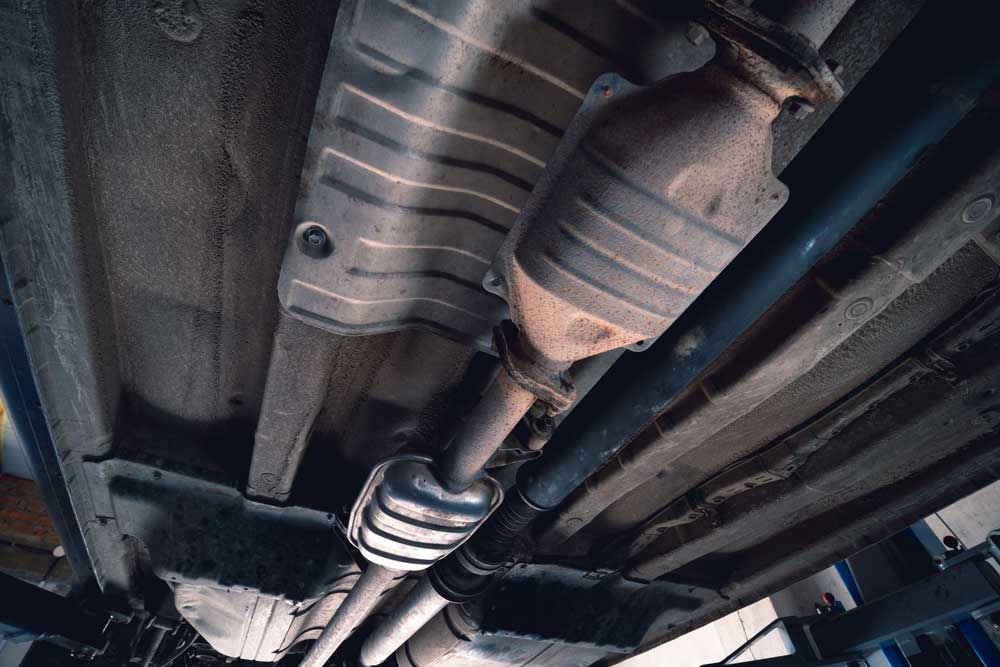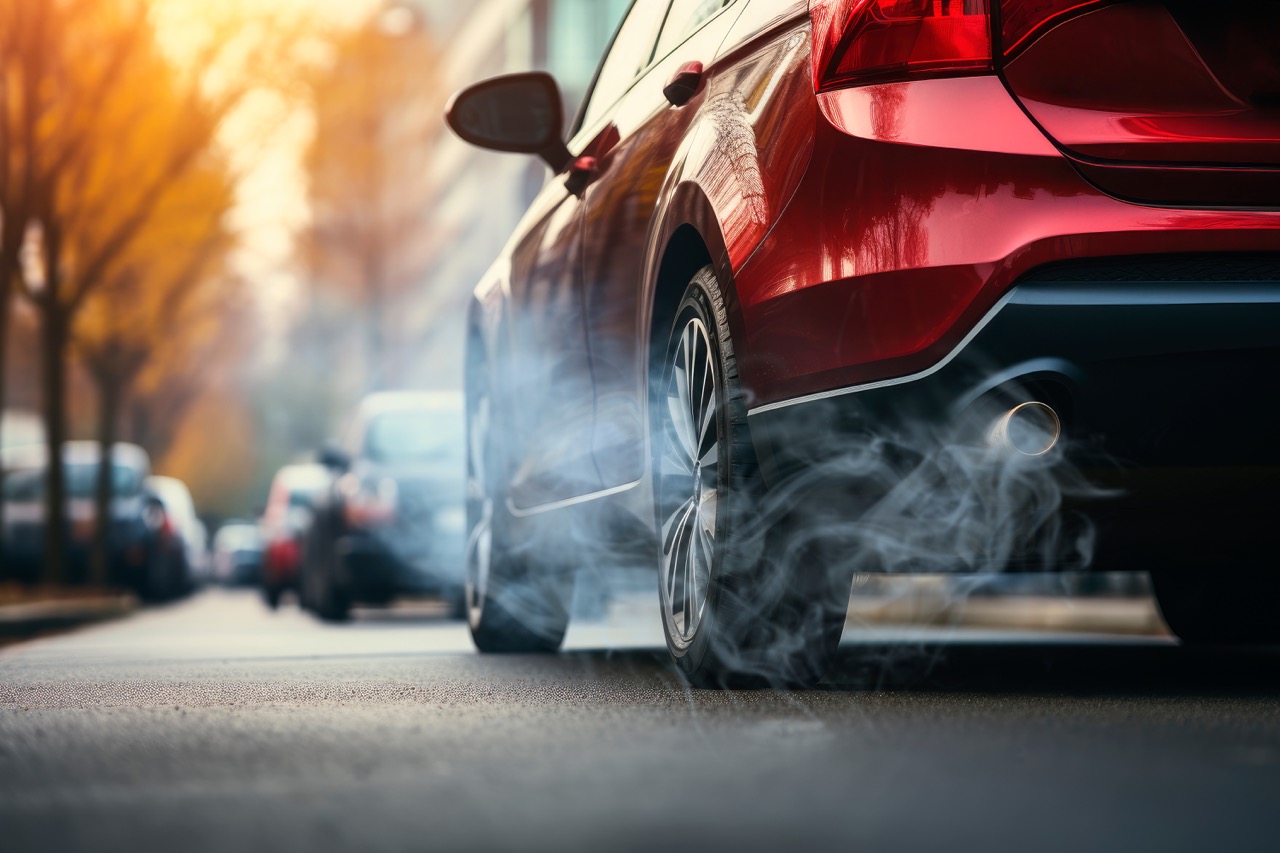
A catalytic converter is part of a vehicle’s emissions system that converts harmful emissions into less-toxic particles or gases. Learn more from the Brigham City car repair experts at Master Muffler.
Why We Need Catalytic Converters
Gasoline and diesel engines run on forms of petroleum, which contains hydrocarbons. When these hydrocarbons are combined with oxygen and heated, they release compounds such as carbon dioxide and water. Relatively harmless, these aren’t the elements a catalytic converter aims to reduce.
With all the different chemicals in fuel, the chemical reaction of heating it with oxygen does produce some byproducts that are considered pollutants. These include carbon monoxide, volatile organic compounds (VOCs), and nitrogen oxides.
The invention of the catalytic converter is credited to Eugene Houdry in 1950. Houdry’s goal was to make fuel burn cleaner, and in the 1970s chemical engineers, Carl Keith and John Mooney continued to improve upon his designs.
How Does a Catalytic Converter Work?
To prevent these harmful compounds from leaving our cars via the exhaust system, a catalytic converter works to break up these molecules into less harmful ones. In a vehicle, the catalyst can be made with metal such as platinum, palladium, or rhodium. These precious metals are what make catalytic converters so expensive, and prone to theft.
In internal combustion engines, a catalytic converter speeds up the removal of pollution by preventing it from entering the atmosphere in the first place. Exhaust fumes enter the converter’s input pipe, located underneath the body of your vehicle. The fumes pass through a honeycomb-shaped structure in the converter box, allowing the chemical reaction to occur. Once completed, the now-cleaner fumes exit the converter via the output pipe, also known as the exhaust pipe.
Two Processes in Catalytic Conversion
- Reduction – removing oxygen
- Oxidation – adding oxygen
Our vehicles need to remove the oxygen from nitrogen oxides in order to emit nitrogen and oxygen gases, which are naturally occurring in our atmosphere. Our vehicles also need to add oxygen to carbon monoxide to create carbon dioxide instead. From that point, the carbon dioxide can be oxidized further to create water vapor.
This process explains why this emissions element is referred to as a three-way catalytic converter; it’s conducting three different chemical reactions.
Type of Fuel to Use
Catalytic converters work best with unleaded fuel so as not to interfere with the conversion process (lead prevents a converter from working properly). Be sure you’re pumping unleaded fuel into your gasoline-powered car to get the best results from your converter.
Most Valuable Catalytic Converters
Thanks to those precious metals that comprise catalytic converters, they’re a common item stolen off of vehicles. The most valuable converters are deemed such due to their build, as well as the difficulty of the labor to install them.
- Ferrari F430 – valued between $3,770 and $7,540
- Lamborghini Aventador – valued between $3,120 and $6,240
- Dodge Ram 2500 – valued at $3,460
- Ford F250 – valued at $2,804
- Ford Mustang – valued at $1,500
Whether diesel- or gasoline-fueled, this costly car repair is one no driver wants to encounter thanks to thieves. Even mid-range vehicles have converters that can cost between $800 and $1,200, not including installation costs. One of the most common Brigham City car repair concerns we see involves exhaust systems, which can range from the muffler and pipes to the catalytic converter.
How Effective are Catalytic Converters?
They’ve come a long way over the years, no longer requiring as much time to heat up before being effective. Data comparing vehicles without a converter, vehicles with a two-way converter, and vehicles with a three-way converter report the following reduction of pollutants measured in grams per kilometer for each:
No Catalytic Converter
- 1.5 grams per kilometer of hydrocarbons
- 15 grams per kilometer of Carbon monoxide
- 1.9 grams per kilometer of nitrogen oxides
Two-Way Catalytic Converter
- 0.5 grams per kilometer of hydrocarbons
- 7 grams per kilometer of carbon monoxide
- 1.3 grams per kilometer of nitrogen oxides
Three-Way Catalytic Converter
- 0.25 grams per kilometer of hydrocarbons
- 2.1 grams per kilometer of carbon monoxide
- 0.63 grams per kilometer of nitrogen oxides
Catalytic Conversion in Diesel Engines
Diesel-fueled engines have a different version of a catalytic converter that works to reduce pollutants in their own way. Major differences are noted below.
- Two-way oxidation process versus three-way catalyst
- No reduction catalyst means diesel engines do produce more nitrogen oxides
- Diesel catalytic converters remove physical particulates such as soot and soluble organic fraction (SOF)
- Larger diesel vehicles may have more than one catalytic converter in the emissions system.
We hope we won’t have to see you for repairing or replacing a catalytic converter, but please know your Brigham City car repair team is here if you have questions or concerns. Contact us today for diagnostics, alignments, and more.
Related Posts
As an EV owner, understanding your vehicle's battery is critical. From its capacity to its lifespan, and everything in between, we'll guide you through what you need to know to optimize your EV experience. So buckle up and get ready - we're about to shed some light on the electrifying world of EV batteries. What [...]
If your car is running hot, it can be a sign that something’s not right with your engine. Fortunately, diagnosing the cause of an overheating engine isn't too difficult if you know what to look for and how to address it. Keep reading if you want to learn the most common issues that occur when [...]
Your vehicle's exhaust system serves a critical role in managing the byproducts of the combustion process and ensuring optimal engine performance. The appearance of colored smoke from the exhaust pipe, either when stationary or accelerating, can provide valuable clues to underlying mechanical issues. What is a car exhaust? A car exhaust is a system [...]





